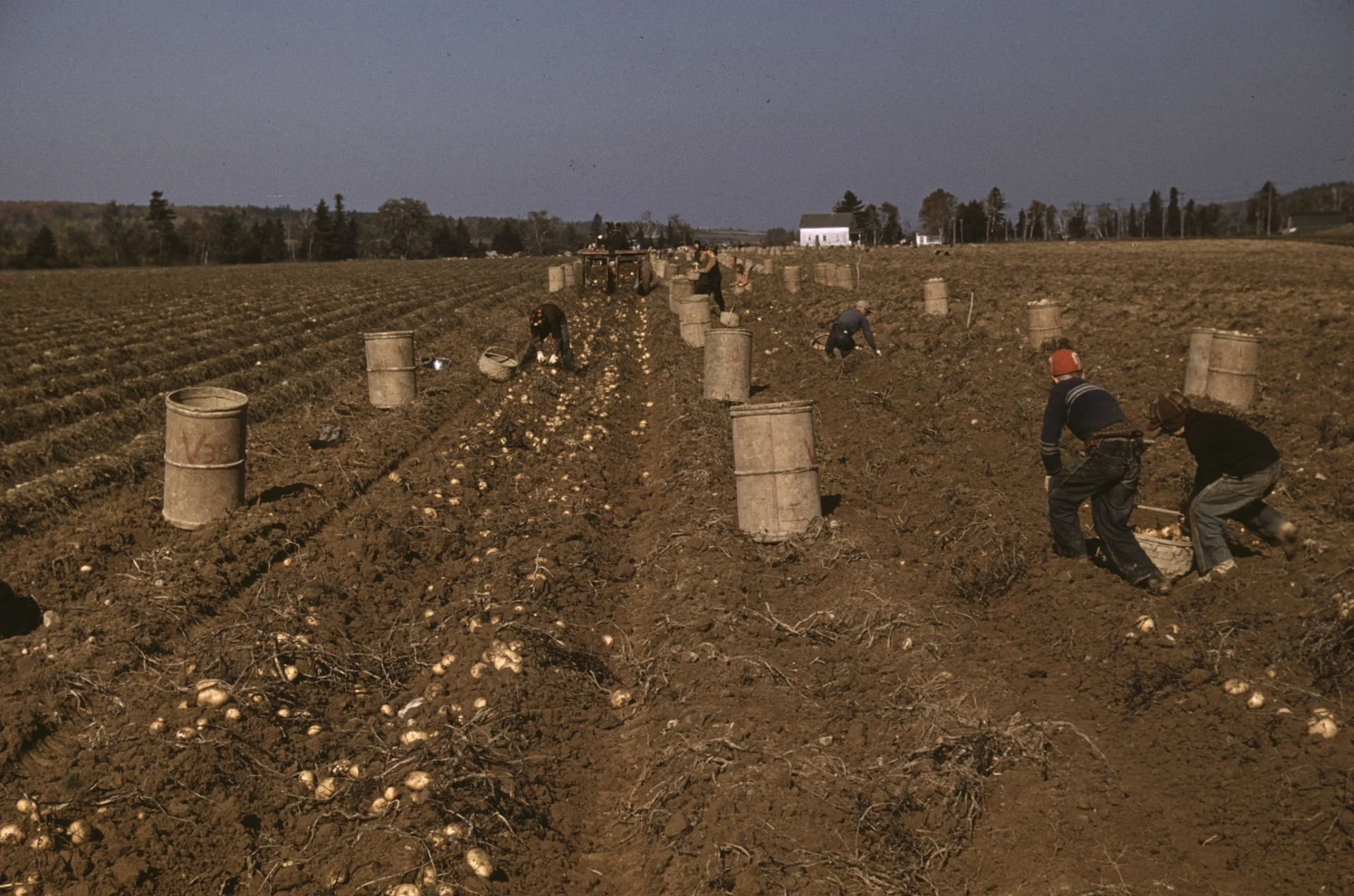
Potatoes and canoes in Maine's big country
Children gathering potatoes on a large farm in Aroostook County in1940. In those days, schools did not open until the potatoes were harvested. The country long competed with Idaho to be considered the potato capital of America.
— Photo by Jack Delano
“This is big country, larger than Connecticut and Rhode Island combined, nearly the equal of Massachusetts; its vastness is more suggestive of the West than of New England. It winters, people will tell you, are fiercer, its forests thicker, it rivers wilder than anywhere else in the East.’’
Mel Allen, on Aroostook County, Maine, in “There’s No Easy Way to Pick Potatoes,’’ in the September 1978 issue of Yankee magazine. Mainers simply call Aroostook “The County’’. Its voters tend to favor right-wing politicians.
Allagash Falls on “The County’s” Allagash River
Why Maine’s politically amoral Sen. Collins won
Seal of Sen. Susan Collins’s Trumpian heartland, Aroostook County, land of potatoes and moose.
Children gathering potatoes on a large farm in Aroostook County, 1940. Schools did not open until the potatoes were harvested.
— Photo by Jack Delano.
From Robert Whitcomb’s “Digital Diary,’’ in GoLocal24.com
Perhaps the most-watched political event in New England in this political cycle was Maine Republican Sen. Susan Collins’s re-election victory over Maine House Speaker Sarah Gideon, a Democrat, which didn’t surprise me. Senator Collins, a cynic with very plastic principles, or perhaps none at all (recalling her deeply immoral Senate leader, Mitch McConnell, for whom money and power are all), won because she has provided very good constituent services and had deep support in the Trumpian northern part of the state, especially Aroostook County, where she’s from.
Her victory will help ensure that a President Biden will have a tough time getting his judicial and other nominees confirmed and make it more difficult for New England, as a region, if not Maine, to get its fair share of federal programs.
Troy Jackson/Mike Carpenter: Let Maine’s ‘The County’ help other New England states reach renewable-energy goals
Aroostook County, the largest and northernmost county in New England, is most famous for its potatoes. In Maine, Aroostook is often just called “The County.’’
From ecoRI News (ecori.org)
As state senators for Aroostook County in Maine, we plan to usher in a new era of renewable-energy investment in our state. And that means talking with our neighbors in other New England states about the benefits of siting projects in Maine to help them reach their renewable-energy goals, while at the same time inviting investment that helps us with property tax relief, jobs, and energy security.
One potential partner is due south, in Rhode Island. In 2017, Gov. Gina Raimondo set an ambitious goal to increase the amount of renewable energy serving Rhode Island to 1,000 megawatts by 2020. Rhode Island recently took a major step toward reaching that goal by issuing a request for proposals for 400 megawatts of renewable energy from a broad portfolio of resources, including solar and onshore and offshore wind, generated either in state or imported from another state.
We want Maine to be a partner in reaching that goal. The commitment that Rhode Island is making to renewable energy is laudable, and Maine’s new legislature and state government are ready to support it. Rhode Island has already established itself as an innovation leader in renewable energy, with the nation’s first offshore wind facility.
To ensure safe, reliable, affordable renewable energy for Rhode Islanders, the state needs to aim for a diversified energy mix, and that mix should include the cheapest form of renewable-energy generation: onshore wind.
Rhode Island has an opportunity to get affordable, sustainable renewable energy from Maine’s Number Nine Wind Farm. Located in Aroostook County, our home county, the largest and northernmost in New England, the Number Nine Wind Farm would generate 250 megawatts of renewable power — enough energy to power some 109,000 average Rhode Island homes annually. That amount of power would save more than 383,000,000 gallons of water each year, and be the equivalent of taking more than 122,000 cars off the road.
Wind energy also enhances air quality by helping to mitigate the health effects of harmful air pollutants.
Closer to home, this project will mean significant property tax revenue, helping to alleviate property tax burden of Aroostook County residents. EDP Renewables has also committed funds to help Aroostook County residents offset burdensome home-heating costs.
Additionally, development of the Number Nine Wind Farm, and the electrical transmission supporting it, will be an important step toward a long-deferred dream of connecting northern Aroostook County to the New England electrical grid — in much the same way that Block Island was connected to the larger regional grid in conjunction with the development of the nation’s first offshore wind farm.
The advantages of the Number Nine Wind Farm go beyond its cost-effectiveness for ratepayers. The project will provide profound economic benefits to New England in the form of hundreds of full-time jobs during its construction, dozens of permanent jobs during the life of the project, as well as increased regional economic activity that will continue throughout the project’s lifetime.
Number Nine is good for Rhode Island and for Aroostook County, and that’s why we support it.
Rhode Island has already begun reaping the benefits of the Number Nine project, in the form of a partnership between EDP Renewables and the New England Institute of Technology to develop and train workers with the knowledge and technical skills required for wind-energy generation. By creating renewable-energy jobs and supporting high-quality training for local people who aspire to work in them, EDP Renewables has demonstrated its commitment to the state, and to the future of renewable energy in New England and beyond.
The Number Nine Wind Farm represents the culmination of more than 15 years of development activity seeking to harness the powerful wind resource of Aroostook County. Number Nine’s owner and eventual operator is one of the leading developers of onshore wind in the country, so Rhode Islanders and Mainers alike can rest assured that this project will be operated at the highest standards throughout its life. Equally important, this well-engineered and comprehensively reviewed project enjoys the support of Maine citizens, elected officials and community leaders, who recognize the economic and environmental value it brings.
The question before Rhode Island now is what renewable-energy projects are best positioned to meet the state’s ambitious energy goals. The answer, my friends, is blowing in the wind …. from Maine.
Troy Jackson is a Democratic state senator from Maine’s 1st Senate District and is the president of the Maine Senate. Mike Carpenter, also a Democrat, is a six-term state senator from Maine’s 2nd Senate District.
A fearsome place
Children gathering potatoes on a large farm in Aroostook County in 1940. Schools did not open in those days until the potatoes were harvested.
-- Photo by Jack Delano for the WPA
"This is big country, larger than Connecticut and Rhode Island combined, nearly the equal of Massachusetts; its vastness more suggestive of the West than of New England. Its winters, people will tell you, are fiercer, its forests thicker, its rivers wilder than anywhere else in the East.''
-- Mel Allen on Aroostook County, Maine, in "There's No Easy Way to Pick Potatoes,'' in the September 1978 issue of Yankee magazine.






